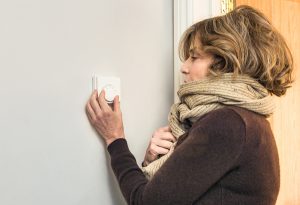Why Do Women Typically Feel Colder Than Men?
The ongoing battle over the thermostat is an all-too-common scenario in many homes and offices. The reason women might find themselves reaching for a sweater more often than men can be summed up in two words: metabolic rate.
“Since women have a lower metabolic rate, they tend to produce less heat than men do, which makes them feel colder,” explains Rob Danoff, DO, an osteopathic family physician from Philadelphia.
Focusing on preventive care, Doctors of Osteopathic Medicine, or DOs, look beyond your symptoms to consider how environmental and lifestyle factors impact your health. They are trained to listen and partner with you to help you not only get healthy, but stay well.
‘Walking space heaters’
The body’s metabolism is responsible for the production of energy, including heat. Although men and women maintain an internal body temperature of 98.6 degrees, men typically have more muscle mass and generate more heat by using more calories to fuel those extra muscles. When that heat evaporates, it warms up their skin, their clothes and the air just above the surface of their skin.
“Basically, men generate their own little heat islands, kind of like walking space heaters,” Dr. Danoff says. “But since women typically have less muscle mass and evaporate less heat through the pores in their skin, they might feel colder than men in a room with the same air temperature.”
Some studies have shown that while men feel comfortable in rooms with the thermostat set at 72 degrees, women tend to feel comfortable in rooms with the thermostat set at 77.
Women and menopause
Middle-age women might feel warmer while going through menopause but that sudden feeling of heat comes courtesy of hormonal changes, not an increase in muscle mass, Dr. Danoff explains.
The good news is that comfort levels begin to even out as men and women age.
After menopause, women return to their previous room temperature comfort level. Men, however, begin to lose the extra muscle mass as they age. When this happens, they stop generating as much heat and might begin to feel cold in room temperatures that were previously comfortable to them.
When to see a physician
Feeling cold all the time, however, could be the sign of a medical issue. It might be time to see the doctor if:
- Your nails turn blue or a dark color.
- You experience chills.
- You start to feel colder than normal.
- Your skin becomes brittle.
- You begin to sweat more or less than normal.
“If you find yourself feeling cold on a regular basis in air temperatures that used to be comfortable for you, it’s a good time to check with your doctor to rule out any medical issues,” Dr. Danoff says.

